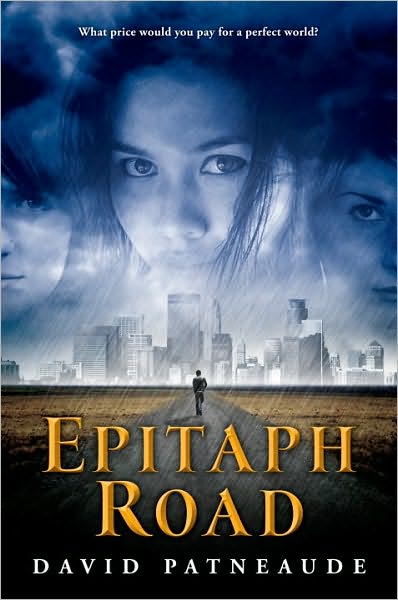 The Book Talk:
The Book Talk:The Review:
I'm a sucker for dystopian literature. If a book is about a futuristic/alternate society where things aren't perfect, I'm probably going to read it no matter what it's about. Epitaph Road is the book I chose for the middle school book group I'm running at the library I work for, because I wanted to choose a good middle school appropriate dystopia that could get them talking.
One of the most important aspects of a dystopian novel, for me, is the world-building. In order for an oppressive society to believable, the world in which it is set has to be well constructed and vividly imagined. I enjoyed the basic concept of the world in this book. It was an interesting idea to play with a society that is mostly run by women (one that I thought was very well done in the adult graphic novel Y: The Last Man). There are glimpses of great world building in Epitaph Road, but overall it was less vivid than I wanted it to be. There's a little history lesson embedded in the story that gives some background on the way the world came to be, but I never really felt immersed. It also felt a little odd to me that the main character, a male, did generally seem to agree with the fact that a society with only 5% men was better than one with a 50/50 gender ratio (women can live safely, FINALLY!). Basically, the idea was interesting, but the world and its concept could have been better and more clearly executed.
I felt kind of the same way about everything else in this book, actually -- like it was about halfway to where it needed to be. The action and the setting was a little muddy (I just had a hard time picturing what was happening), and the characters were just not that interesting. A lot of terrible things happen to people in this book, and I never really felt like I got to know any of them well enough to care about their well-being and their relationships with each other. I did enjoy the voice of the main character (David Patneaude does not dumb down the text, which is nice), but I to know more about the differences in personality between Tia and Sunday, the two main female characters (to me, they really seemed like the same person).
Overall, not a bad dystopia, but not one of my favorites either. I wanted more clear realization of the world and its characters, but the overall sad mood of the book really did take me in and make me think. I would recommend this book for 6th graders and older who like books like Gone and The Hunger Games. I know a lot of other people enjoyed this book, so I'd love to hear other opinions!
Random side note: David Patneaude is actually coming to my middle school book group at the library tomorrow, and I'm looking forward to what he says about his novel. Maybe my opinion'll change a bit once I've heard him speak!
